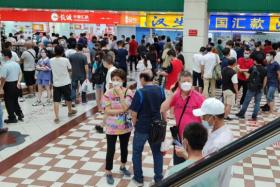Consumer price index up due to oil price recovery
Third straight month of positive inflation last month
Singapore logged its third straight month of positive inflation in February, owing in part to gradually recovering oil prices.
This comes as the economy is also showing tentative signs of stronger growth this year, on the back of a more sanguine global outlook.
But the pick-up in both consumer prices and growth has not been broad-based, which is why economists largely do not expect the central bank to tweak its exchange rate policy at its meeting next month.
The consumer price index - the main measure of inflation - edged up 0.7 per cent last month compared with February last year, according to figures released yesterday by the Department of Statistics.
This came after a record two-year spell of negative inflation from November 2014 to October last year, and a reading of 0 per cent in November. Inflation finally turned positive in December.
Lower oil and car prices and falling accommodation costs - partly due to the soft property market - were the main drivers behind that long bout of negative inflation.
February's uptick came on the back of higher private road transport costs.
Food and services costs also rose, though slower than in January.
Core inflation, stripping out accommodation and private transport to better gauge everyday expenses, was 1.2 per cent in February, down from January's 1.5 per cent.
A joint statement from the Monetary Authority of Singapore (MAS) and Ministry of Trade and Industry said higher inflation is on the cards this year due to recovering global oil prices, rises in carpark charges and household refuse collection fees, as well as upcoming hikes in water prices, among others.
Higher inflation usually puts pressure on the central bank to tighten monetary policy, by allowing the Singdollar to appreciate at a faster rate against the currencies of key trading partners.
But economists say MAS is likely to leave its exchange rate policy unchanged at next month's meeting.
The central bank uses the exchange rate as its main monetary policy tool to strike a balance between inflation from overseas and economic growth.
A stronger currency counters inflation by making imports cheaper in Singdollar terms.
Get The New Paper on your phone with the free TNP app. Download from the Apple App Store or Google Play Store now



